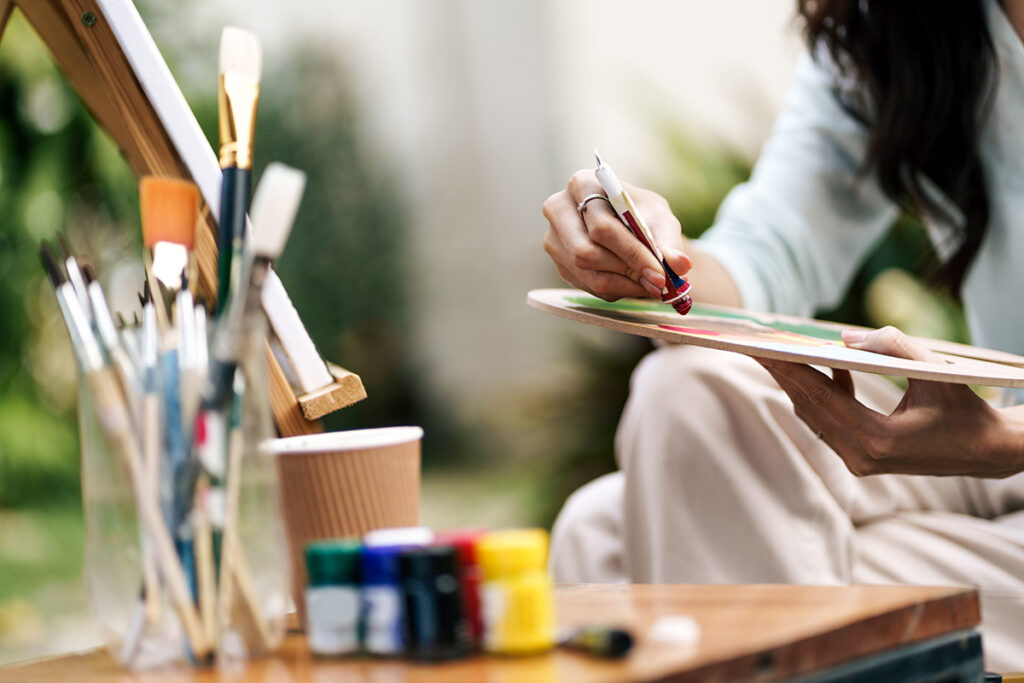Whereas other forms of therapy focus on open dialogue as a tool for emotional expression, art therapy prefers creation as its primary way of expression. For more information on art therapy services and benefits, contact The Willows at Red Oak Recovery® at 828.518.6941 today. We help women in our care heal and thrive.
What Is Art Therapy?
Art therapy is a form of psychotherapy that uses various art forms as a means of expression and communication. It involves the use of visual arts, such as painting, drawing, sculpting, and other creative techniques to help individuals process and express their emotions. This therapeutic approach combines traditional talk therapy with the creation of art to promote emotional healing and growth.
Art therapy works by providing a safe and non-judgmental space for individuals to explore their thoughts and feelings through the medium of art. A trained therapist guides the individual through the creative process, allowing them to freely express themselves without fear or inhibition. Art therapy is designed to help those who have difficulty expressing their emotions. This difficulty in feeling and expressing emotions can display itself in many different ways. Some may have trouble externalizing their feelings through non-destructive means, while others may have difficulty accessing traumatic memories due to dissociation or other versions of burying the trauma.
The Importance of Art Therapy Programs
Art therapy aims to strengthen clients’ ability to connect their thoughts and feelings with their impulses and actions to gain better control and understanding of their mental health. Benefits commonly associated with art therapy are:
- Promotes healthy emotional expression
- Opportunity for emotional release
- Stress management
- Stress reduction
- Improved understanding of the recovery process
- Increased ability to articulate and communicate emotions that were previously difficult to express
- Opportunity for creative self-expression
- Increases motivation
- Improves self-confidence
Art therapy doesn’t simply incorporate art exercises into another form of therapy. Instead, art and creative expression are the primary focus of the treatment so that clients may find more comfortable methods for expressing their emotions.
What to Expect from Art Therapy Services
Women participating in an art therapy program can expect to learn how to:
- Find new and creative ways of expressing themselves
- Identify emotions through created art forms
- Use art as a form of relaxation
- Communicate, articulate, and connect feelings with actions
- Better understand the healing process
- Apply learned skills and techniques in daily life
Art therapy encourages self-discovery and personal growth while providing practical tools for managing mental health.
Women and Art Therapy
Art therapy is an ideal form of therapy for women, as it provides a safe and supportive environment to explore emotions and experiences that may be difficult to put into words. It can also help women build confidence in their ability to express themselves and connect with others. We know that women have faced different challenges and traumas than men, which is why our art therapy program is specifically designed for women.
Often, women are unfairly burdened with societal expectations and pressures, leading to feelings of shame, guilt, and inadequacy. Art therapy can help women process these emotions and find ways to cope with them in a healthy manner.
Types of Arts Therapy Techniques
There are various types of arts therapy techniques that can be used in a treatment program, including:
- Painting and drawing
- Collage making
- Sculpting with clay or other materials
- Photography and photo collages
- Music and songwriting
- Dance and movement
Each technique offers unique benefits and can be tailored to the individual’s needs. The goal is to find a form of art that allows for comfortable expression and emotional release.
Benefits of Women-Centric Art Therapy
We understand that women face unique challenges and traumas, which is why our art therapy is specifically designed for women. Our therapists are trained to address gender-specific issues and provide a safe space for women to explore their emotions.
In addition, having an all-female group can create a sense of camaraderie and support among the participants. Women may feel more comfortable sharing their experiences with others who have faced similar struggles.
Call The Willows Today
If you or a loved one could benefit from art therapy, contact The Willows at Red Oak Recovery® today. Our compassionate and professional team can provide more information on our art therapy services and how they can be incorporated into your personalized treatment plan. Take the first step towards healing and thriving by reaching out to us at 828.518.6941 or online today.

